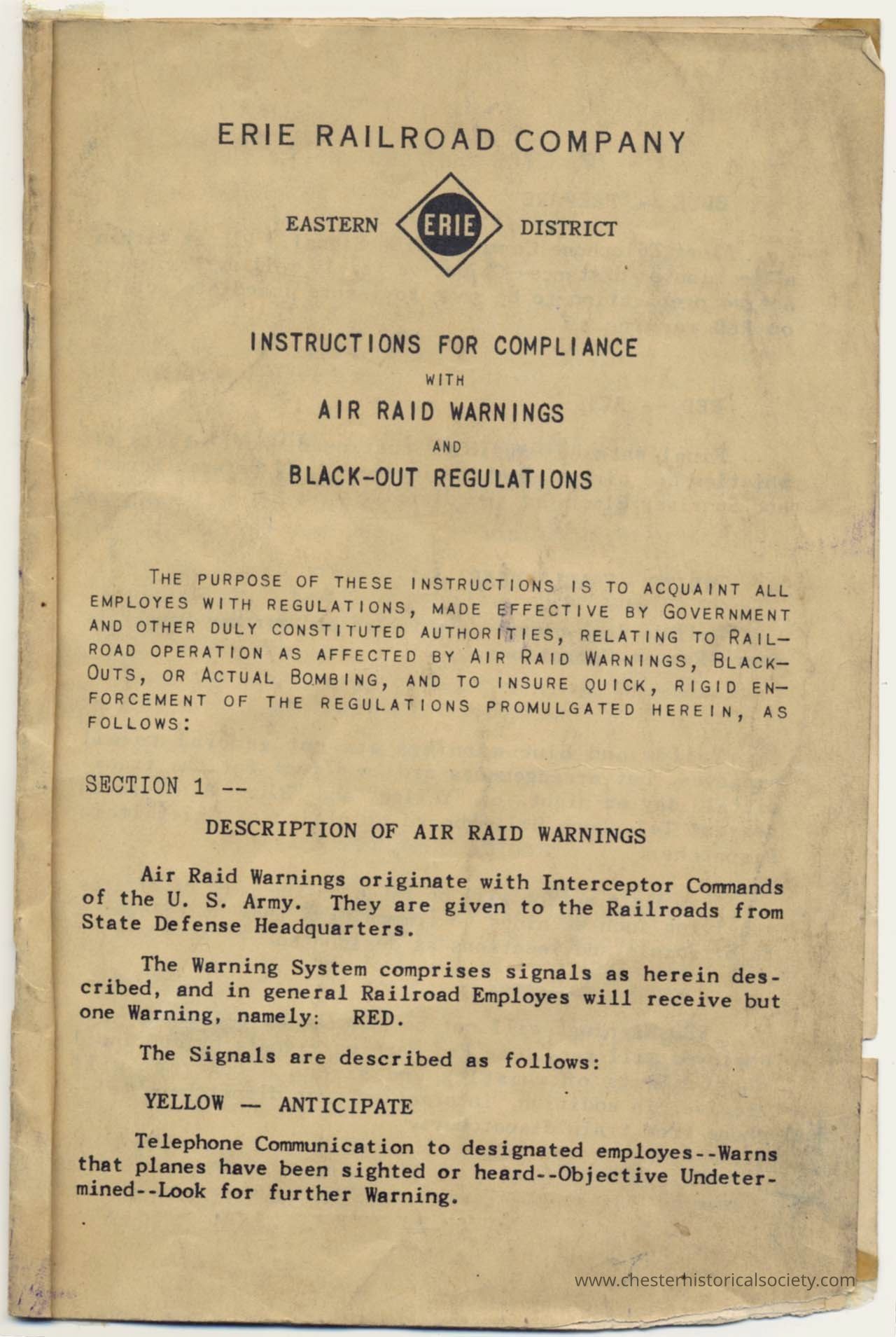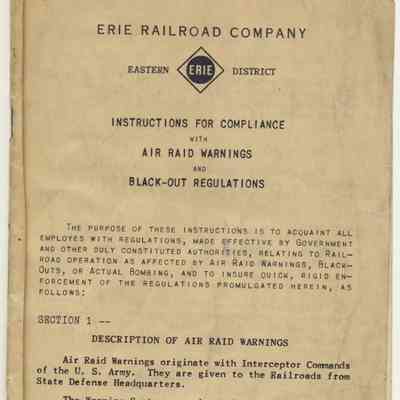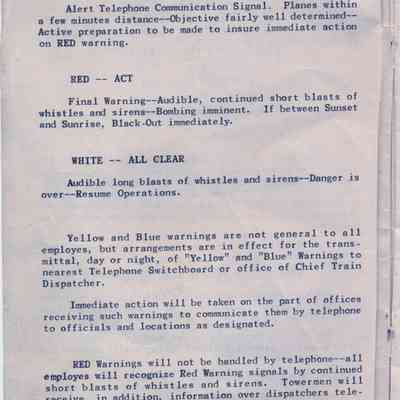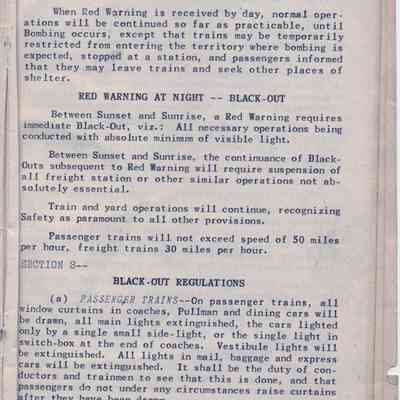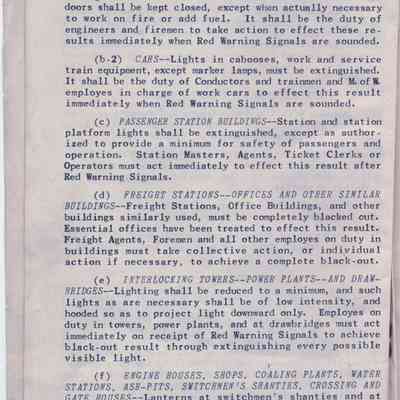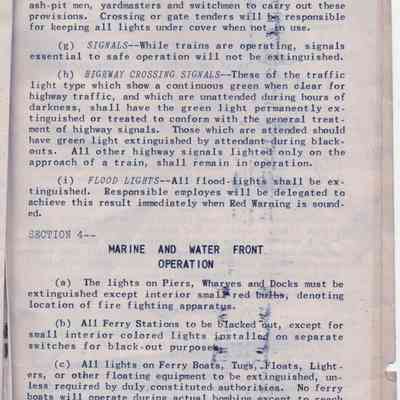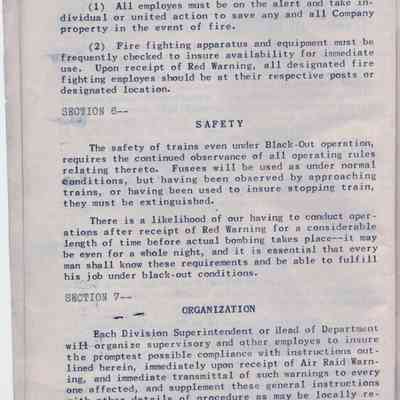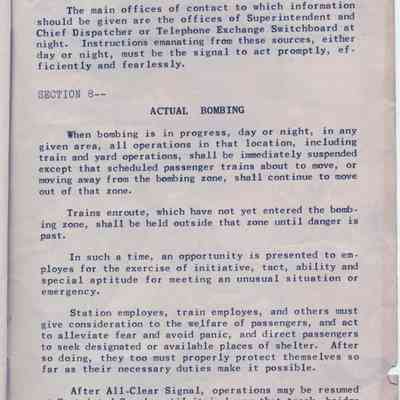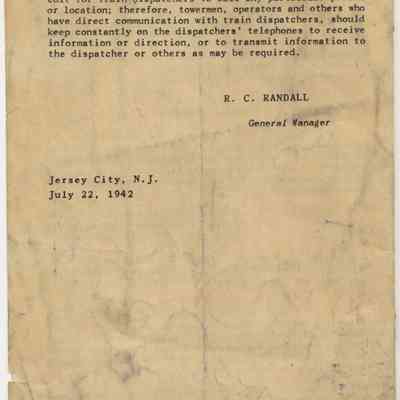Transcription
Erie Railroad Company
Eastern District
Instructions For Compliance
with
Air Raid Warnings
and
Black-out Regulations
Purpose of these instructions when all employees regulations, made effective by government and other duly constituted authorities, relating to railroad operation has affected by air raid warnings, blackouts, or actual bombing, and insure quick, rigid enforcement of all regulations promulgated, as follows:
Section 1––
Description of Air Raid Warnings
Air Raid Warnings originate within separate commands of the U. S. Army. They are given to the railroads from State Defense Headquarters.
The warning system comprises signals as herein described, and in general railroad employees receive but only one warning, namely: red.
The Signals are described as follows:
Yellow–Anticipate
Telephone Communication to designated employee––Warns that planes have been sighted or heard––Objective Undetermined––Look for further Warning.
[ page 2 ]
BLUE - PREPARE
Alert Telephone Communication Signal. Planes within few minutes distance--Objective fairly well determined-Active preparation to be made to insure immediate action on RED warning.
RED -- ACT
Final Warning--Audible, continued short blasts of histles and sirens--Bombing imminent. If between Sunset and Sunrise, Black-Out immediately.
WHITE -- ALL CLEAR
Audible long blasts of whistles and sirens--Danger is over--Resume Operations.
Yellow and Blue warnings are not general to all employes, but arrangements are in effect for the transmittal, day or night, of "Yellow” and “Blue" Warnings to learest Telephone Switchboard or office of Chief Train Dispatcher.
Immediate action will be taken on the part of offices receiving such warnings to communicate them by telephone to officials and locations as designated.
RED Warnings will not be handled by telephone--all employes will recognize Red Warn1ng signals by continued short blasts of whistles and sirens. Towermen will receive, in addition, information over dispatchers telephone from train dispatchers.
-2-
[ page 3 ]
SECTION 2--
OPERATION OF THE RAILROAD
RED WARNING -- DAYTIME
When Red Warning is received by day, normal operations will be continued so far as practicable, until Bombing occurs, except that trains may be temporarily restricted from entering the territory where bombing is expected, stopped at a station, and passengers informed that they may leave trains and seek other places of shelter.
RED WARNING AT NIGHT -- BLACK-OUT
Between Sunset and Sunrise, a Red Warning requires immedate Black-Out, viz.: All necessary operations being conducted with absolute minimum of visible light.
Between Sunset and Sunrise, the continuance of Black-Outs subsequent to Red Warning will require suspension of all freight station or other similar operations not absolutely essential.
Train and yard operations will continue, recognizing Safety as paramount to all other provisions.
Passenger trains will not exceed speed of 50 miles per hour, freight trains 30 miles per hour.
SECTION 3--
BLACK-OUT REGULATIONS
(a) PASSENGAR TRAINS--On passenger trains, all window curtains in coaches, Pullman and dining cars will be drawn, all main lights extinguished, the cars lighted only by a single small side-light, or the single light in switch-box at the end of coaches. Vestibule lights will be extinguished. All lights in mail, baggage and express cars will be extinguished. It shall be the duty of coniuctors and taifter they have been drawn.
(b-l) LOCOMOTIVES--Headlights, Front and Rear, shall be put on dimmer, and back-up light extinguished, white lantern to be substituted therefor. On yard engines
-3-
[ page 4 ]
not equipped with dimmer, headlights, front and rear, will be extinguished end white lantern substituted therefor. Cab signals, not essential to safe operation, shall be extinguished. Storm curtains shall be drawn. Fire box doors shall be kept closed, except when actually necessary to work on fire or add fuel. It shall be the duty of engineers and firemen to take action to effect these results immediately when Red Warning Signals are sounded.
(b-2) CARS--Lights in cabooses, work and service train equipment, except marker lamps, must be extinguished. It shall be the duty of Conductors and trainmen and M. of W. employes in charge of work cars to effect this result immediately when Red Warning Signals are sounded.
(c) PASSENGER STATION BUILDINGS--Station and station platform lights shall be extinguished, except as authorized to provide a minimum for safety of passengers and operation. Station Masters, Agents, Ticket Clerks or Operators must act immediately to effect this result after Red Warning Signals.
(d) FREIGHT STATIONS--OFFICES AND OTHER SIMILAR BUILDINGS--Freight Stations, Office Buildings, and other buildings similarly used, must be completely blacked out. Essential offices have been treated to effect this result. Freight Agents, Foremen and all other employes on duty in buildings must take collective action, or individual action if necessary, to achieve a complete black-out.
(e) INTERLOCKING TOWERS--POWER PLANTS--AND DRAWBRIDGES--Lighting shall be reduced to a minimum, and such lights as are necessary shall be of low intensity, and hooded so as to project light downward only. Employes on duty in towers, power plants, and at dra~bridges must act immediately on receipt of Red Warning Signals to achieve black-out result through extinguishing every possible visible light.
(
(f) ENGINE HOUSES, SHOPS, COALING PLANTS, WATER STATIONS, ASH-PITS, SWITCHMEN'S SHANTIES, CROSSING AND GATE HOUSES--Lanterns at switchmen's shanties and at crossing and gate houses, kept lighted and ready for use, must be at all times kept under cover, except when in use. Otherwise, all lights except in black-out treated rooms,
-4-
or sections, shall be extinguished, and employes performing essential work, during the black-out, must use low intensity flashlights showing a white light. It shall be the duty of engine house foremen, coaling plant employes, ash-pit men, yardmasters and switchmen to carry out these provisions. Crossing or gate tenders will be responsible for keeping all lights under cover when hot in use.
(g) SIGNALS--While trains are operating, signals essential to safe operation will not be extinguished.
(h) HIGHWAY CROSSING SIGNALS--These of the traffic light type which show a continuous green when clear for highway traffic, and which are unattended during hours of darkness, shall have the green light permanently extinguished or treated to conform with the general treatment of highway signals. Those which are attended should have green light extinguished by attendant during black-outs. All other highway signals lighted only on the approach of a train, shall remain in operation.
(i) FLOOD LIGHTS--All flood-lights shall be extinguished. Responsible employes will be delegated to achieve this result immediately when Red Warning is sounded.
SECTION 4--
MARINE AND WATER FRONT. OPERATION
(a) The lights on Piers, Wharves and Docks must be extinguished except interior small red bulbs, denoting location of fire fighting apparatus.
(b) All Ferry Stations to be blacked-out, except for small interior colored lights installed on separate switches for black-out purposes.
(c) All lights on Ferry Boats, Tugs, Floats, Lighters, or other floating equipment to be extinguished, unless required by duly constituted authorities. No ferry boats will operate during actual bombing except to reach tie-up point, after which all lights must be extinguished.
(d) All Tug-Boat captains will immediately communicate with tug dispatcher and proceed to point as ordered.
-5-
[ page 6 ]
SECTION 5--
FIRE PROTECTION
(1) All employes must be on the alert and take individual or united action to save any and all Company property in the event of fire.
(2) Fire fighting apparatus and equipment must be frequently checked to insure availability for imedmiate use. Upon receipt of Red Warning, all designated fire fighting employes should be at their respective posts or designated location.
SECTION 6--
SAFETY
The safety of trains even under Black-Out operation, requires the continued observance of all operating rules relating thereto. Fusees will be used asunder normal conditions, but having been observed by approaching trains, or having been used to insure stopping train, they must be extinguished.
There is a likelihood of our having to conduct operations after receipt of Red Warning for a considerable length of time before actual bombing takes place--it may be even for a whole night, and it is essential that every man shall know these requirements and be able to fulfill his job under black-out conditions.
SECTION 7--
ORGANIZATION
Each Division Superintendent or Head of Department will organize supervisory and other employes to insure the promptest possible compliance with instructions outlined herein, immediately upon receipt of Air Raid Warning, and immediate transmittal of such warnings to every one affected, and supplement these general instructions with other details of procedure as may be locally required.
Railroad employes under Black-Out or Bombing conditions are soldiers protecting Home Defenses, and must
-6-
[ page 7 ]
conduct themselves in the same true spirit of patriotism and loyalty which is expected of those actually in military service.
The main offices of contact to which information should be given are the offices of Superintendent and Chief Dispatcher or Telephone Exchange Switchboard at night. Instructions emanating from these sources, either day or night, must be the signal to act promptly, efficiently and fearlessly.
SECTION 8--
ACTUAL BOMBING
When bombing is in progress, day or night, in any given area, all operations in that location, including train and yard operations, shall be immediately suspended except that scheduled passenger trains about to move, or moving away from the bombing zone, shall continue to move out of that zone.
Trains enroute, which have not yet entered the bombing zone, shall be held outside that zone until danger is past.
In such a time, an opportunity is presented to employes for the exercise of initiative, tact, ability and special aptitude for meeting an unusual situation or emergency.
Station employes, train employes, and others must give consideration to the welfare of passengers, and act to alleviate fear and avoid panic, and direct passengers to seek designated or available places of shelter. After so doing, they too must properly protect themselves so far as their necessary duties make it possible.
After All-Clear Signal, operations may be resumed at Restricted Speed, until it is known that track, bridge and other conditions are safe for train movements.
-7-
[ page 8 ]
During black-outs or actual bombing, it may be difficult for train dispatchers to call any particular person or location; therefore, towermen, operators and others who have direct communication with train dispatchers, should keep constantly on the dispatchers’ telephones to receive information or direction, or to transmit information to the dispatcher or others as may be required.
R. C. Randall
General Manager
Jersey City, N.J. July 22, 1942